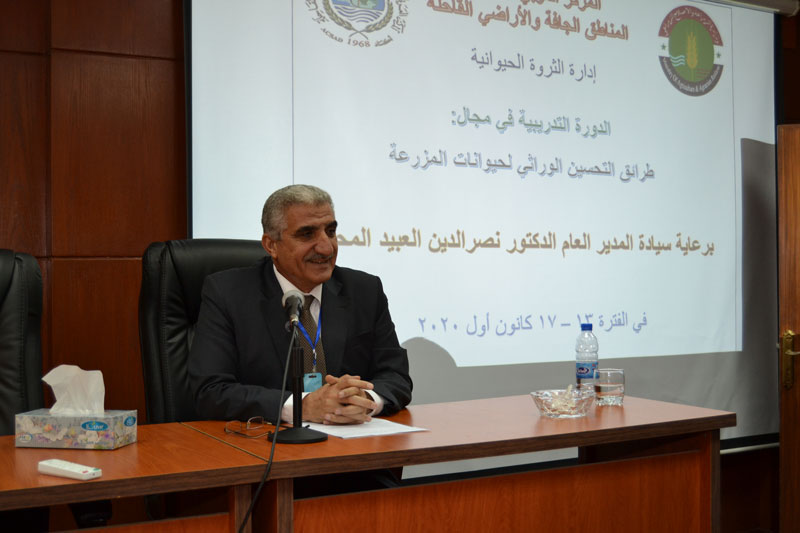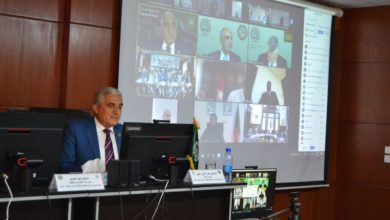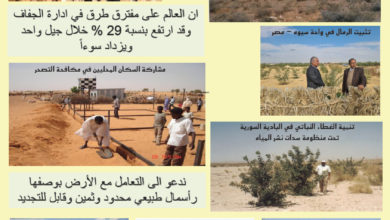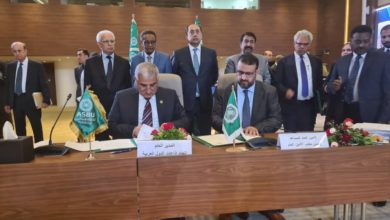Genetic improvement of Farm Animals / Training Course in ACSAD
Today, at the headquarters of the Arab Center for the Studies of Arid Zones and Drylands (ACSAD), Damascus, the activities of the training course on “genetic improvement of farm animals” started in the presence of the member of the leadership of the Arab Baath Socialist Party branch in Hama governorate, the head of the offices of peasants and sub-workers, Mr. Makhzoum Haidar, and a turnout of Syrian, Arab experts and researchers.
In his opening speech, the Director-General of the Arab Center (ACSAD) Dr. Nasr Edin Obeid said that this session comes within the programs of the ACSAD organization to raise the capabilities of technical cadres in the agricultural sector in all Arab countries, especially the headquarters, beloved Syria, land of steadfastness.
Dr. Obaid expressed his profound thanks and appreciation to the Syrian Arab Republic, the leadership, the Government, and the people, for its unlimited support of the ACSAD organization, which contributed to the continuation of its work and its implementation programs, projects, and activities as planned. He also welcomed the Minister of Agriculture and Agrarian Reform, Engineer Mohammad Hassan Qatna, describing him as the holder of vision and development dimension in the agricultural sector’s issues.
He pointed out that ACSAD accumulated many successful experiences, especially in the field of livestock, which contributed to enhancing and improving the income of many breeders, reducing the percentage of mortality rate to less than 1%, and increasing the number of animals by 50% in their herds, by providing the first-aid kit and animal production tools, improving the fodder value of agricultural residues, and increasing their capability to manufacture milk products through training programs.
The Director-General of the Arab Center (ACSAD), Dr. Nasr Edin Obaid, referred to ACSAD great interest in the domestic livestock breeds and its ongoing work to improve its products while maintaining its coping abilities to confront climatic changes and resist diseases. ACSAD research has improved the Awassi sheep milk production, which averaged 294kg/season, with a twinning percentage of 45%, while the average milk production at the Shami goat was about 497 kg/season, and a twinning percentage of 77%, approaching to the global breeds.
The Arab Center (ACSAD) is holding this course for the benefit of twelve agricultural engineers and veterinarians from the Syrian General Commission for Scientific Agricultural Research (GCSAR) and the Ministry of Agriculture and Agrarian Reform of the Syrian Arab Republic, and its applied scientific activities continue for five days (from 13 to 17/12/2020), at ACSAD headquarters in Damascus and its research station in Izara (Daraa governorate – Southern Syria.
The course activities include several subjects some of, how to preserve and improve local agricultural animal breeds and the foundation of their nutrition, the forces and genetic properties and characteristics of clans, genetic measurements of quantitative traits, the livestock database and records, genetic bases for selection and hybridization, genetic evaluation of animals, the most important diseases that affect agricultural animals, and the use of modern techniques to guide reproduction, and how to establish the core herds in small ruminants and other related topics.
A selection of ACSAD specialized experts give a scientific lecture and do the practical training.




